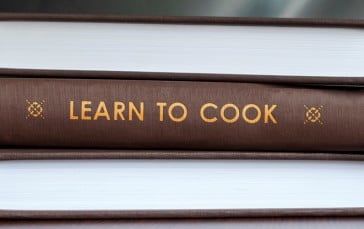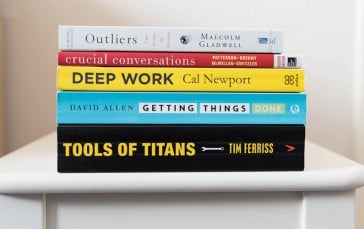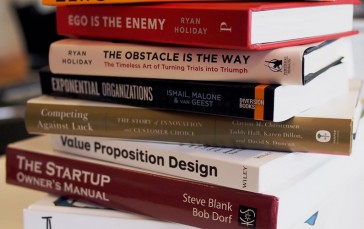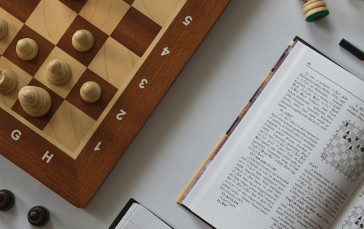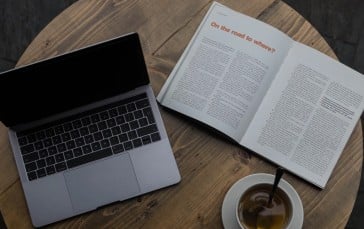Best Self-Help Books for Men in 2022
Men don’t need self-help books. We’re men! When we get thrown from the horse we brush ourselves off and get right back in the saddle. When the world gives us broken eggs we make omelets. And when feelings threaten to overwhelm us we cast them aside and go conquer a new world or invent some game-changing device or create a timeless work of art or… or…. Or maybe, when nobody’s looking, we reach for one of the following titles because truth is told, they’re the best self-help books for men. And we could all use a little help from time to time.
The Best Self-Help Book for Men
1The Subtle Art of Not Giving a F*ck

“The Subtle Art of Not Giving a F*ck” is what happens when a guy gets tired of trying to channel his inner Dalai Lama and decides that what’s really wrong with his life is that he cares too much. Not a book the politically correct crowd is going to embrace The Subtle Art of Not Giving a F*ck is not in the least bit subtle when it comes to doling out advice about how men can get their lives back on track. The secret? Just stopping giving a f*ck about so many things you can’t control and focus instead on those things that make you want to get up in the morning. For more amazing books, check out our guide to the best camping books.
2Thinking, Fast and Slow

According to psychologist and Nobel Prize winner Daniel Kahneman the thing that prevents most men from being happy is a disconnect between the intuitive, emotional side of our brains and the more deliberate, contemplative, and logical side. Kahneman’s goal is to make us aware of the fact that these two modes of thought are often in conflict with each other and proposes ways we can rectify the situation in order to lead more successful, satisfying lives. Thinking, Fast and Slow is a lively tour of discovery through our grey matter that, with any luck, will get you thinking. Albeit slowly. Our guide to the best business books features more great titles.
3You Are a Badass

Maybe you are and maybe you aren’t but you’ll never know until you learn how to get out of your own way. In “You Are a Badass” the author combines timely stories, helpful exercises, hard-earned wisdom, and a light-hearted approach to help you understand how and why you get in your own way and what you can do to stop shooting yourself in the foot. Learn how to discard the things that drag you down, how to make more money, and how to turn hidden desires and aspirations into the raw materials of a new, more fulfilling life. This book also makes a perfect Christmas gift every man will love.
4Wherever You Go, There You Are

“Wherever You Go, There You Are” is set to celebrate its 25th anniversary in 2019 and is still considered one of the best personal development books ever written. That’s because its simple truths have been resonating with readers since the day it hit the bookshelves in 1994. For the author, Jon Kabat-Zinn, the secret to living a happier, more well-rounded, and satisfying existence are to identify those things that are creating stress in your life and neutralize them through a combination of mindfulness and acceptance. For more great stress relieve options, check out our guide to the best adult coloring books.
512 Rules for Life

In his book “12 Rules for Life: An Antidote to Chaos”, psychologist Jordan B. Peterson combines the noble truths of ancient spiritual traditions with revelations being brought to light by leading-edge scientific research to form a thesis on happiness and fulfillment that is both eye-opening and easy to comprehend. In 12 Rules he takes a holistic approach to the psychology of happiness, finding useful examples of spiritually productive behavior in everything from the lowly lobster to the rituals of the ancient Egyptians. Old meets new, East meets West and crustacean meets corporate executive in 12 Rules for Life. A perfect gift for the man who has everything.
67 Habits of Highly Effective People

7 Habits of Highly Effective People has been one of the top self-help books since it was first published in 1989. In it, author Steven Covey posits that the reason most people never realize their potential is that they don’t know how to deal effectively with even the simplest of problems that crop up in the day to day life. Covey proposes a systematic approach to problem-solving based on identifying your core values and argues that his assembly-line approach is actually the best way to find closure when it comes to vexing situations. The closure that allows you to move on effectively. It also makes an ideal gift for the manly man in your life.
7The Life-Changing Magic of Tidying Up

Some people seek happiness in money, others in sex, others in shopping. But according to Japanese cleaning expert Marie Kondo, the true secret to happiness is decluttering your home. According to Kondo, there are certain items in everyone’s house that spark joy, but most of the time they’re buried beneath a mountain of clutter that grows like mushrooms in the dark in spite of our best efforts to bring it under control. In The Life-Changing Magic of Tidying Up, Kondo professes that if you follow her simple method for organizing your home you’ll never be overwhelmed by clutter again and both your mind and your spirit will be set free. It makes a perfect housewarming gift for everyone’s’ bookshelf.
8Quiet

Not every guy is the in-your-face type. A large portion, in fact, is decidedly introverted. They’d rather listen than talk, keep to themselves than engage in heated debate and let their actions speak for them instead of their words. While author Susan Cain’s attempts to discredit extroverts in her book “Quiet” seem more than a little unnecessary and even counterproductive she nonetheless offers many insights into the power of quiet, determined action that shouldn’t be ignored. And many others that could be useful to anyone looking for a way to be more efficient and more effective in pursuit of their goals.
9The Art of Persuasion

“The slow blade pierces the shield”. This line from David Lynch’s sci-fi cult classic “Dune” is a perfect metaphor for the idea that persuasion, rather than confrontation and intimidation, is often the most effective strategy for getting what you want. In “The Art of Persuasion” author Bob Burg examines how some of history’s most successful and influential individuals got where they did by making others feel important, keeping an open mind (or at least appearing to), relying on some simple pieces of common wisdom and using a deft hand in dealing with difficult individuals. It’s a fascinating read and one of the most persuasive self-help books for men out there. If you like books and food, be sure to check out our guide to the best cookbooks for our top picks.
10Outliers

Not what many guys would consider a “self-help” book, Malcolm Gladwell’s “Outliers” is nonetheless a fascinating read that could very well light a fire under your butt and make you want to get out there and get something done. Gladwell’s thesis is that, when trying to analyze what makes extraordinary people extraordinary, too much emphasis is placed on their personalities and not enough on the environments and experiences that shaped those personalities. To him, the reasons why Bill Gates and the Beatles reached the mountaintop had less to do with winning personalities than with the forces that put wind in their sails when they were young. A perfect addition to your bookcase collection.
11The Untethered Soul

In “The Untethered Soul” author Michael Singer revisits well-traveled Buddhist concepts dealing with the nature and sources of unhappiness and discontent. The Buddha said that misery and suffering were the results of our desires run amok. And that if we could let go of expectations and wants and focus instead on the truth of the moment we would be privy to deep underlying truths and freed from the bad habits and pointless fears that hold us back. Singer essentially presents these noble concepts in a way that’s more palatable to the contemporary audience and also provides some useful exercises that will help hasten your transition to a higher state of awareness.
12The Power of Habit

Most people are creatures of habit but few are the guys who spend much time examining their habits to determine if they’re productive or counterproductive. Author and business reporter Charles Duhigg takes an empirical look at habits, how they came to be and the value in swapping out bad habits for better ones. Duhigg recognizes that simply stating that bad habits produce bad results would be pointless. So he digs down to the psychological foundations of habits to reveal their profound utility and then proposes a number of practical ways you can convert your old habits into new ones that will get you where you want to be. “The Power of Habit” is one of the more practical self-improvement books around and our Best Value.
13Beyond Anger

Men are different than women. Well duh. One doesn’t need cutting-edge science to know that men and women process and express their feelings differently. But it’s still helpful for guys to develop some tools for dealing with anger in a way that doesn’t result in them lashing out or otherwise losing control. “Beyond Anger” is perhaps the most useful insights here are the ones that focus on how angry outbursts can affect family members, friendships, and professional relationships. And the most useful suggestions are those that offer a way to process feelings more effectively before they explode outward and damage our relationships and social standing.
14The Art of Happiness

Speaking of the Dalai Lama… The Dalai Lama is the only religious leader on earth who is found, rather than selected. The 14th and current Dalai Lama, Tenzin Gyatso, was discovered when he was two years old and has been among the most sought-after inspirational speakers on the planet for nearly 70 years. While he has authored numerous texts on a variety of scientific, religious, and humanist topics his “Art of Happiness” is perhaps his most enduring work. In it, he helps the reader make sense of our chaotic and enervating world and offers a path to happiness based on a combination of Buddhist teachings, experience, and common sense.
15Eat That Frog!

There’s an old adage that states if you eat a live frog first thing in the morning your day can only get better after that. Whereas many personal development books for men focus on ways to avoid or transcend difficult or unpleasant situations “Eat That Frog” author Brian Tracy suggests the best way to achieve both success and contentment is to tackle your worst problem first. After that, the rest of your day will seem like a nice easy glide downhill. Recently revised with two new chapters dealing with maintaining focus in the age of everything all the time and how technology can help you prioritize.
For chess lovers, we have prepared our selection of the best chess books. Check them out.
16Man’s Search for Meaning

Man’s Search for Meaning is one of the 20th century’s most important philosophical tomes. Written by Viktor Frankl, a survivor of Auschwitz who watched most of his loved ones get devoured by the Nazi death machine, this riveting meditation on existence concludes that man is driven not by a lust for pleasure but rather by a search for meaning. Contrary to Buddhist teachings Frankl – no doubt influenced by his own experience – postulates that suffering is inevitable, not avoidable. But that we don’t have to indulge it. Instead, we can harvest meaning from it that will allow us to move on with purpose.
17Feel the Fear . . . and Do It Anyway

Walking through our fears is a common subject for the best self-help books for men and “Feel the Fear… and Do It Anyway” is one of the most well-known books on the subject. In it, author Dr. Susan Jeffers looks at the origins of fear, its function, and how we can transcend it. She provides techniques and fear management concepts that help one navigate their fears, acknowledge them, and then move beyond them. She also offers her own 10-step method for winning the debate with the negative voices within. One of the best books for men out there.
18Unfu*k Yourself

We’d all like to be unf*cked and Gary John Bishop is here to tell us how to do that. Unlike most self-development books “Unfu*k Yourself” doesn’t assume you’re a sensitive wallflower and furthermore it doesn’t care if you are. It says you and your masochistic tendency to underestimate yourself is what’s standing in your way. This isn’t exactly tough love but it’s not a soft nurturing voice that’s going to promise you a participation trophy either. Bishop says you’ve fu*ked yourself and if you really want to live your dreams you have to stop doing that. Thankfully, he also provides some timely suggestions on how to break the cycle of self-defeat.
19Own the Day, Own Your Life

Onnit founder and CEO Aubrey Marcus has some thoughts about how a guy can set his life on a more productive and satisfying course. To him, this life thing isn’t mysterious or particularly difficult to master. It all comes down to the choices we make. To illustrate his point he guides the reader on a journey through a single day, shining a light on the impact of the various choices we make from the time we roll out of bed to the time we roll back in. Own the Day, Own Your Life is more than a little like a Monty Python sketch “First, become a doctor and discover a marvelous cure for something…” but he does provide some useful insight.
20Atomic Habits

Did you know there were “leading experts” on habit formation? Neither did we. But apparently, there are and James Clear is one of them. In his book “Atomic Habits” Clear teaches you how to identify those habits that are acting as an anchor on your life and how you can form new, more productive habits without having to undergo hypnosis or join a cult. Making and breaking habits is not rocket science but it is a behavioral science and Clear plums the depths of the subject to find simple, easily executable methods for creating new, more effective habits that will work for you and not against you.
21How to Win Friends and Influence People in the Digital Age

Professional men have been reading Dale Carnegie’s legendary self-help book since it was first released in 1936. How to Win Friends and Influence People created the blueprint for people like Tony Robbins but in recent years it was in danger of becoming somewhat irrelevant. The folks at the Carnegie Institute have addressed that issue with an update of the great man’s work that addresses specific issues as they relate to the digital age. Learn how to communicate productively, how to use digital tools to network and make yourself more attractive, and how to project your message in a clear, easy to understand way. Before you’re done you’ll be a more efficient professional and a more effective leader.
22Getting Past Your Past

We are, as someone once said, the sum total of our experiences. That’s both reassuring and a bit frightening. Especially if your experiences haven’t all been great. In “Getting Past Your Past” author Francine Shapiro addresses the influence our past has on our present, how unresolved feelings from past events can weigh on our today’s and how to free yourself from the burden of past events and clear your slate for the future. GPYP is well-written, engaging, funny in some places, and eye-opening in others. Don’t let unconscious backwash from past events discolor your present-day efforts. Learn how to get past your past using a few simple tricks.
2310% Happier

Author Dan Harris of “10% Happier” believes we hear voices. Not the kind that emanates from our neighbor’s dog but the kind that tells us to bury our feelings under food, talk when we should listen, and complain when we should be quiet. This voice, according to Harris, also prompts us to fixate on things past and things that haven’t yet happened, all at the expense of the here and now. Harris’ cure for all that subconscious mental gab? Meditation. According to the author and narrator of this new audiobook, learning to meditate effectively can open the door to a considerably happier, healthier you.
24The Game

In The Game, author Neil Strauss takes us on a hilarious journey into what he would have us believe is the magical world of the PUA (pick up artist). It’s a book aimed squarely at confused guys. Those who think that getting laid is the result of some mystical power rather than a simple combination of self-confidence and not looking like a Walking Dead extra. Still, Strauss’s tale is nothing if not funny and before it grinds to its predictable conclusion it manages to paint a memorable picture of contemporary meat markets and he even throws in the occasional close encounter of the celebrity kind.
25Awaken the Giant Within

Tony Robbins learned most of what he knows from Dale Carnegie but much to his credit he’s managed to put his own compelling spin on the idea that success and failure are a matter of how you view the world. In “Awaken the Giant Within” Robbins provides a slew of new and reworked techniques for strengthening your relationships, mastering your emotions, reining in your finances, and getting your life on the straight and narrow to personal and professional success. Does it work? As the master himself might say “you get back what you put in”. Definitely one of the best self-improvement books available, but will require some work on your part.
26The 48 Laws of Power

Some people might take issue with the notion that self-help has anything to do with gaining control over your fellow humans but that doesn’t mean Robert Greene and Joost Elffers’ treatise isn’t worth a read. And who knows? Maybe a ruthless reign of terror is just what the doctor ordered to snap you out of your funk. The authors scour thousands of years of rule and ruin and distill it all into The 48 Laws of Power they believe govern all power relationships. The whole thing fits nicely into the postmodern fetish for reducing complex issues to tidy ordered lists. But following the suggestions here is more likely to wind you up in front of a judge than an army of acolytes. Still, nothing ventured nothing gained.
27Make Your Bed

In “Make Your Bed” Admiral William H. McRaven shares the lessons he learned during his Navy Seal training as well as those imposed upon him by years of military experience to suggest ways we can get more out of the lives we’re given, while simultaneously making the world around us a little better for everyone. The book is based on a commencement address McRaven gave some years back and expands on the salient points within that address. The Admiral’s guidance is delivered with the steady hand and in the measured tone you’d expect from a senior military commander and there are no gratuitous pats on his own back along the way. Just what you want to see in good self-help books.
28The Mask of Masculinity

Like a lot of people who decided on career paths before they really knew who they were the author of The Mask of Masculinity, Lewis Howes woke up one day to confront an uncomfortable reality. He was, by any surface definition, “successful”. But his inner self was crying out for some TLC. So began what he describes as a journey of self-discovery. The bad news? Instead of looking inward, Howe reaches out to a rogue’s gallery of celebrities in a move that undermines his credibility and turns his “journey” into more of an SEO campaign than a search for the essential self. The good news? Some compelling truths about the origins of unhappiness manage to emerge nonetheless.
29Boundaries Updated and Expanded Edition

“Boundaries”, the bestseller from Drs Henry Cloud and John Townsend, was an expansive investigation into the phenomenon of how we define ourselves and our space. This new and expanded edition takes a closer look at some of the ramifications of setting effective boundaries and provides some useful insight on where and how to draw the line in a way that benefits everyone. Along the way it provides effective ways to say no, to define the limits of your availability, and to set healthy boundaries that will give you the space you need to breathe and grow. Not for agnostics.
30Everything That Remains

“Everything That Remains”, the final entry on our list of best self-help books for men comes to us from Joshua Fields Millburn, a now 30-something upwardly mobile millennial who discovered one day that his life was a sorry collection of things that meant nothing to him. In the wake of his revelation, he embraced a lifestyle philosophy called “minimalism” where he ditched the ephemera of consumerism (credit cards, stuff), shed debt, and walked away from a 6-figure job. Millburn doesn’t spend much time explaining how he did it, instead he focuses on why. Compelling reading if you can get past the fact that he actually just traded his high paying office job for a high paying writing job.

